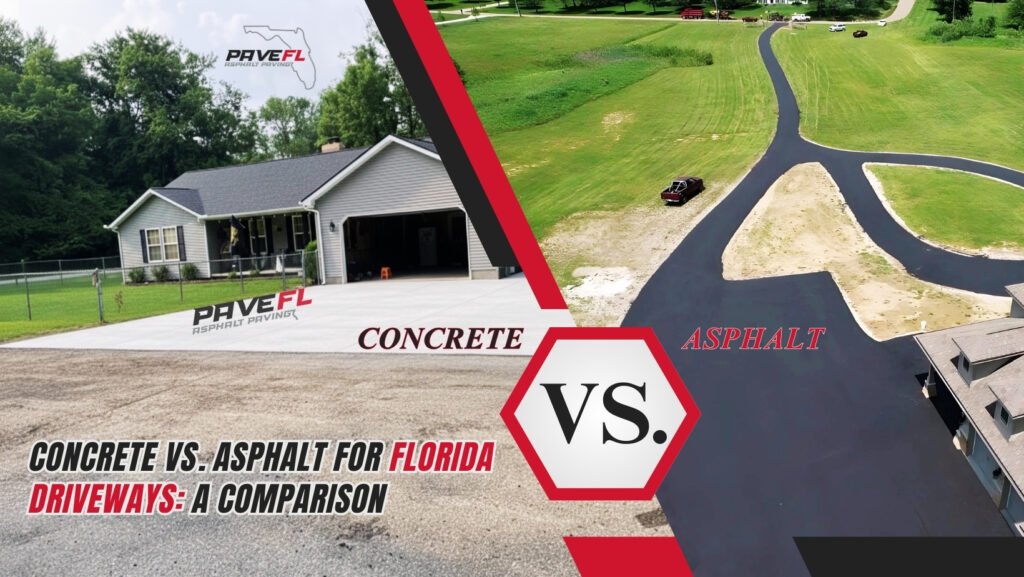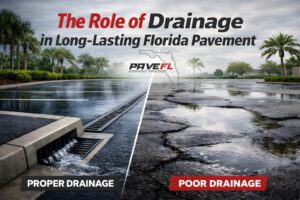
Thinking about installing or replacing your driveway in Florida? First, knowing the comparison between concrete & asphalt before choosing the right material is one of the most important decisions you’ll make for your home’s curb appeal, longevity, and value. In the Sunshine State’s challenging climate—where heat, humidity, and heavy rain are part of daily life—the choice often comes down to two materials: asphalt or concrete. Both are durable and widely used, but each behaves differently under Florida’s unique environmental conditions & paving services in Miami. This comprehensive guide examines the key differences between asphalt and concrete driveways, including cost, durability, maintenance requirements, and climate performance, enabling you to make an informed decision that suits your property and budget.
Why Florida’s Climate Matters?
When it comes to driveway materials and pavement performance, Florida’s climate presents unique challenges that set it apart from other regions. The state’s intense heat and year-round sunshine expose surfaces to constant UV rays, which can cause materials to fade, soften, and weaken over time. Frequent rainfall and heavy storms add another layer of stress, eroding the sub-base and wearing down surfaces if drainage isn’t properly designed. During hurricane season, driveways must also be able to withstand flooding, fallen debris, and the weight of cleanup equipment. Additionally, Florida’s sandy soil can make it challenging to maintain a stable foundation—if not properly compacted, driveways may shift or sink. Understanding these environmental factors is key to choosing the right paving materials and construction methods that ensure lasting strength and durability in the Sunshine State.
Before comparing materials, it’s important to understand why driveway performance in Florida is different from other regions:
- Heat & UV Rays: Florida’s scorching summers can cause materials to expand, fade, and weaken.
- Rainfall & Flooding: Heavy storms can erode sub-bases and wear down surfaces.
- Hurricanes & Storm Debris: Driveways must withstand fallen branches, flooding, and heavy cleanup equipment.
- Soil Conditions: Sandy soil in many Florida areas requires a stable foundation to prevent shifting or sinking.
Asphalt Driveways in Florida
Asphalt remains one of the most popular driveway materials in Florida—and for good reason. Its lower upfront cost makes it a practical choice for homeowners looking for a durable yet budget-friendly surface. Installation is relatively quick, meaning less disruption to your daily routine, and asphalt’s natural flexibility allows it to expand and contract with Florida’s heat without cracking as easily as more rigid materials. Another advantage is the ease of repair—cracks and potholes can often be patched quickly, restoring the surface’s appearance and function.
Benefits:
- Lower upfront cost makes it ideal for budget-conscious homeowners.
- Faster installation means less disruption.
- Flexibility in heat—asphalt expands and contracts without cracking as easily.
- Easier repairs: Cracks and potholes can be patched quickly.
Challenges:
- Heat absorption: Asphalt gets extremely hot in the Florida sun, which can make barefoot walking uncomfortable.
- Requires frequent maintenance: Sealcoating is needed every 2–3 years to protect against UV rays, water damage, and oxidation.
- Shorter lifespan: Even with maintenance, asphalt typically lasts 15–20 years in Florida conditions.
However, asphalt does come with a few challenges in Florida’s climate. Because it absorbs heat, the surface can become extremely hot under the summer sun, making it uncomfortable to walk barefoot. It also requires regular maintenance—typically sealcoating every two to three years—to protect against UV rays, water intrusion, and oxidation. Even with proper care, an asphalt driveway’s lifespan in Florida generally ranges from 15 to 20 years. Understanding these benefits and limitations helps homeowners make informed decisions about whether asphalt is the right choice for their property.
Concrete Driveways in Florida
Concrete driveways are a long-lasting and visually appealing option for Florida homeowners who prioritize durability and design. With a typical lifespan of 25 to 30 years, concrete stands out as one of the most durable paving materials available. Its lighter color helps reflect heat, keeping the surface noticeably cooler than asphalt—a practical advantage for families with children or pets. Concrete also offers excellent design flexibility, as it can be stained, stamped, or colored to complement any home’s exterior style. Additionally, it provides impressive strength, easily supporting the weight of heavy vehicles such as boats, RVs, or work trucks without rutting or deforming.
Benefits:
- Longer lifespan (25–30 years) makes concrete a durable choice.
- Cooler surface: Reflects more heat than asphalt, safer for children and pets.
- Design versatility: Can be stained, stamped, or colored for a custom look.
- Resistant to heavy loads: Handles parked boats, RVs, or large vehicles without rutting.
Challenges:
- Higher upfront cost compared to asphalt.
- Longer curing time: Cannot be used for several days after installation.
- Prone to cracking: Concrete is less flexible; soil shifting or tree roots can cause visible cracks.
- Repair issues: Repairs are often more expensive and harder to blend aesthetically.
Despite these advantages, concrete driveways do have some drawbacks in Florida’s environment. They generally cost more upfront and require a longer curing time before use, which can delay project completion. Because concrete is less flexible than asphalt, it’s more susceptible to cracking from soil movement, temperature changes, or intrusive tree roots. When damage does occur, repairs tend to be more costly and often difficult to blend seamlessly with the existing surface. By weighing these pros and cons, homeowners can better determine whether concrete is the right fit for their needs and local conditions.
Maintenance Comparison
Proper maintenance plays a major role in how long a driveway lasts and how well it performs in Florida’s demanding climate. While both asphalt and concrete require care, their maintenance routines differ significantly.
Asphalt driveways need a bit more regular attention. To protect the surface from UV rays, rain, and oxidation, sealcoating should be applied every two to three years. Any cracks that appear should be repaired as soon as possible to prevent water from seeping in and weakening the base. Over time—typically after 10 to 15 years—a resurfacing layer can restore the driveway’s smooth appearance and extend its lifespan.
Asphalt:
- Seal every 2–3 years.
- Promptly repair cracks to prevent water infiltration.
- Resurface after 10–15 years for renewed life.
Concrete driveways, on the other hand, are generally lower-maintenance but still benefit from routine care. Annual power washing helps remove mildew, stains, and dirt that can build up in Florida’s humid conditions. While sealing is optional, it’s highly recommended in coastal areas to protect against salt exposure and moisture intrusion. Repairs for cracks or surface damage can be more challenging to blend seamlessly, but with proper installation and a stable foundation, concrete driveways can remain attractive and durable for decades.
Concrete:
- Power wash annually to remove mildew and stains.
- Sealing is optional but recommended in coastal areas.
- Crack repairs are harder to disguise, but proper installation reduces risk.
Cost Over Time
When deciding between asphalt and concrete driveways in Florida, it’s important to look beyond the upfront price and consider the long-term investment. Asphalt driveways are generally more affordable to install, making them appealing for homeowners on a budget. However, because asphalt requires more frequent maintenance—such as sealcoating and resurfacing—the total cost over time can approach that of concrete. Concrete driveways, while more expensive initially, tend to have lower maintenance needs and a longer lifespan, which can make them a more cost-effective choice in the long run.
Concrete’s higher durability and lower maintenance demands may justify the initial investment—especially for homeowners seeking a longer-lasting solution in Florida’s challenging climate. For more information about a suitable estimate in the South Florida area, here your trusted source for Asphalt Paving in South Florida, contact Pave FL at: paving estimates in Florida.
Which One is Best for Florida Homeowners?
Ultimately, the best driveway material for your Florida home depends on your priorities, budget, and how long you plan to stay on the property.
Choose Asphalt Paving in South Florida if you’re looking for a more affordable option that can be installed quickly and is comfortable with periodic maintenance like sealcoating. Asphalt’s flexibility also makes it a solid choice for Florida’s shifting soils and extreme temperatures.
Choose concrete service in Florida if you’re planning for the long term and want a cooler, more refined surface that can be customized with decorative finishes. While the upfront cost is higher, concrete’s durability and minimal upkeep can make it a smart investment over time.
In the end, many Florida homeowners prefer asphalt for its cost-effectiveness and easy repairs, while others favor concrete for its longevity, appearance, and design versatility. Understanding the unique demands of Florida’s climate—and the strengths of each material—will help you choose a driveway that’s both beautiful and built to last.
Many Florida homeowners choose asphalt for affordability and flexibility, but concrete wins for longevity and appearance.
Final Thoughts
Both asphalt and concrete driveways can perform exceptionally well with Professional paving experts in South Florida when they’re installed and maintained properly. The right choice ultimately depends on your budget, the specific climate challenges in your area, and how long you plan to stay in your home. To ensure the best results, it’s important to work with a licensed Florida paving contractor who understands the region’s soil conditions, drainage needs, and local codes.
That’s where PaveFL Asphalt Paving Service comes in. With over 15 years of industry experience, PaveFL specializes in asphalt paving, sealcoating, resurfacing, and parking lot maintenance across South Florida. The team combines high-quality materials with expert techniques designed to handle the state’s heat, humidity, and heavy rainfall. Whether you need a new driveway, a commercial parking lot, or maintenance for an existing surface, PaveFL delivers durable, smooth, and professional results tailored to your property’s needs.
Ready to install or replace your driveway? Contact PaveFL today for an expert consultation and customized paving solutions built to last in Florida’s unique climate.














